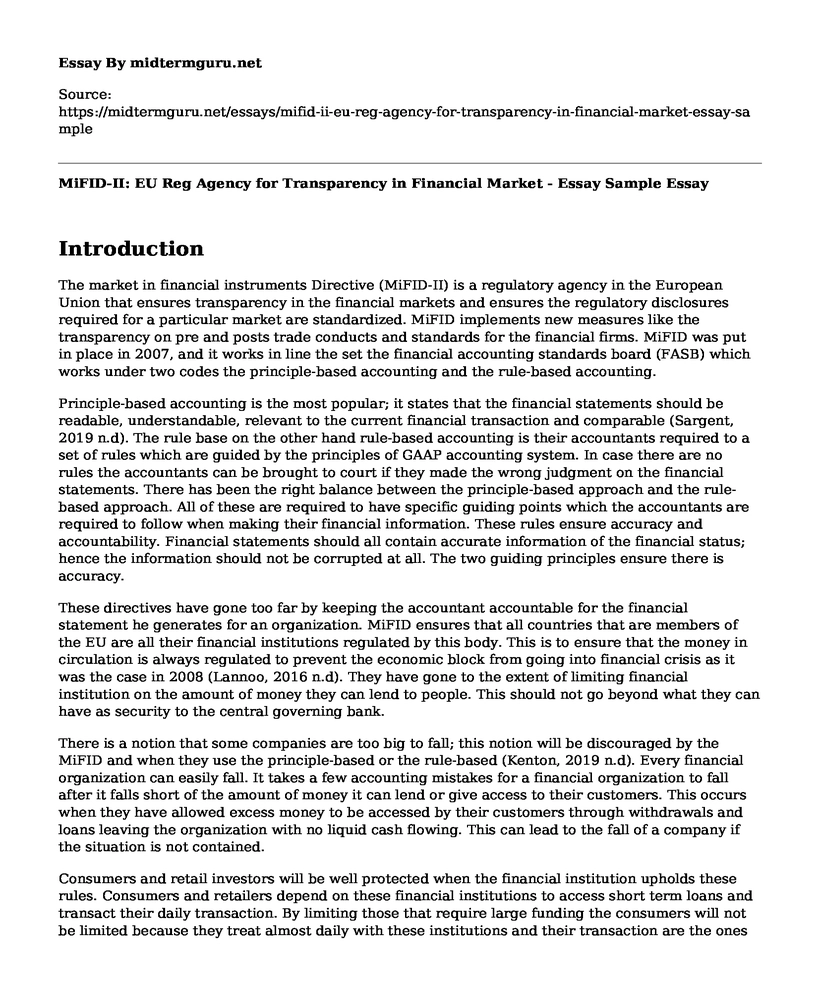Introduction
The market in financial instruments Directive (MiFID-II) is a regulatory agency in the European Union that ensures transparency in the financial markets and ensures the regulatory disclosures required for a particular market are standardized. MiFID implements new measures like the transparency on pre and posts trade conducts and standards for the financial firms. MiFID was put in place in 2007, and it works in line the set the financial accounting standards board (FASB) which works under two codes the principle-based accounting and the rule-based accounting.
Principle-based accounting is the most popular; it states that the financial statements should be readable, understandable, relevant to the current financial transaction and comparable (Sargent, 2019 n.d). The rule base on the other hand rule-based accounting is their accountants required to a set of rules which are guided by the principles of GAAP accounting system. In case there are no rules the accountants can be brought to court if they made the wrong judgment on the financial statements. There has been the right balance between the principle-based approach and the rule-based approach. All of these are required to have specific guiding points which the accountants are required to follow when making their financial information. These rules ensure accuracy and accountability. Financial statements should all contain accurate information of the financial status; hence the information should not be corrupted at all. The two guiding principles ensure there is accuracy.
These directives have gone too far by keeping the accountant accountable for the financial statement he generates for an organization. MiFID ensures that all countries that are members of the EU are all their financial institutions regulated by this body. This is to ensure that the money in circulation is always regulated to prevent the economic block from going into financial crisis as it was the case in 2008 (Lannoo, 2016 n.d). They have gone to the extent of limiting financial institution on the amount of money they can lend to people. This should not go beyond what they can have as security to the central governing bank.
There is a notion that some companies are too big to fall; this notion will be discouraged by the MiFID and when they use the principle-based or the rule-based (Kenton, 2019 n.d). Every financial organization can easily fall. It takes a few accounting mistakes for a financial organization to fall after it falls short of the amount of money it can lend or give access to their customers. This occurs when they have allowed excess money to be accessed by their customers through withdrawals and loans leaving the organization with no liquid cash flowing. This can lead to the fall of a company if the situation is not contained.
Consumers and retail investors will be well protected when the financial institution upholds these rules. Consumers and retailers depend on these financial institutions to access short term loans and transact their daily transaction. By limiting those that require large funding the consumers will not be limited because they treat almost daily with these institutions and their transaction are the ones that benefit these organizations. When it comes to the large transaction, they will be limited, and customers and retailers usually deal with less amount. Bank runs, and pro-cyclisation will not be common since banks will be dealing with a small amount of money which will be hard to find a bank run out of liquid cash.
References
Kenton, W. (2019). Markets in Financial Instruments Directive (MiFID). [online] Investopedia. Available at: https://www.investopedia.com/terms/m/mifid.asp [Accessed 17 Apr. 2019].
Sargent, N. (2019). The Difference Between Principles-Based and Rules-Based Accounting. [online] Investopedia. Available at: https://www.investopedia.com/ask/answers/06/rulesandpriciplesbasedaccounting.asp [Accessed 17 Apr. 2019].
Lannoo, K. (2016). EU financial market access after Brexit. Intereconomics, 51(5), 255-260.
Cite this page
MiFID-II: EU Reg Agency for Transparency in Financial Market - Essay Sample. (2023, Jan 04). Retrieved from https://midtermguru.com/essays/mifid-ii-eu-reg-agency-for-transparency-in-financial-market-essay-sample
If you are the original author of this essay and no longer wish to have it published on the midtermguru.com website, please click below to request its removal:
- The Relationship Between Financial Reporting and Audit Quality - Essay Sample
- Analysis of the Impact of Marketing Communication on Financial Performance With Respect to G2G Company
- Paper Example on Nature and Differences Between For and From AGI Deductions
- Paper Example on Money, Banking and Finance
- Unifying the Social World: How Labor Unites People from Diversified Backgrounds - Essay Sample
- Shift Supervisor Struggles: Low Morale, Pressure, Absenteeism - Essay Sample
- Rebrand & Launch With Amazon: Maximizing Product Advertising Strategies - Essay Sample







